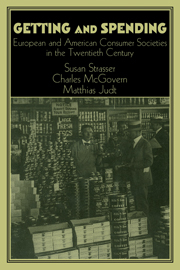Book contents
19 - Modern Subjectivity and Consumer Culture
Published online by Cambridge University Press: 05 January 2013
Summary
My purpose in what follows is to explore the relation between modern subjectivity and consumer culture. But I want to emphasize the historiographical dimensions of this relation - I want to demonstrate that the recent critique of consumer culture is an attempt to retrieve the modern subject from the wreckage of nineteenth-century proprietary capitalism, and that the attempt itself continues to command intellectual respect because it reenacts a “primal scene” of American historiography. The point of emphasizing these historiographical dimensions of the relation between modern subjectivity and consumer culture is of course polemical. Ultimately my claim will be that the critique of consumer culture blocks the search for alternatives to the “man of reason” who served as the paradigm of self-determination in the modern epoch and thus blinds us to the political, intellectual, and cultural possibilities of our own postmodern moment.
Let me begin, then, by defining the terms of my inquiry. By “modern subjectivity” I mean the historically specific compound of assumptions, ideas, and sensibilities that convenes each self as a set of radical discontinuities (e.g., mind versus body), which are in turn projected, as deferred desires - as work and language - into an “external” world of inanimate objects denominated as elements of nature and/or pieces of property. The sovereignty of this modern self is experienced and expressed as the ontological priority of the unbound individual, that is, the individual whose freedom resides in the release from obligations determined by political communities, or, what amounts to the same thing, in the exercise of “natural rights” that such communities can neither confer nor abrogate.
- Type
- Chapter
- Information
- Getting and SpendingEuropean and American Consumer Societies in the Twentieth Century, pp. 413 - 430Publisher: Cambridge University PressPrint publication year: 1998
- 4
- Cited by



